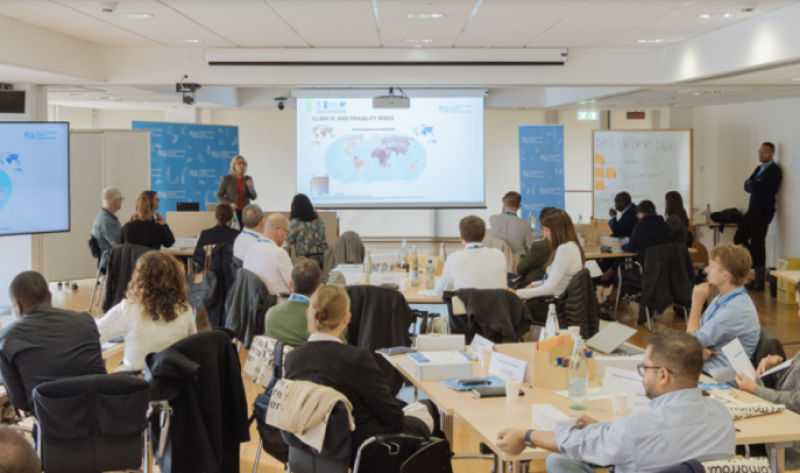

Recent years have seen a growing body of evidence regarding the adverse impact of climate change on peace and security, notably through diminishing livelihoods, compounding competition over resources, and forcibly displacing communities.
Linkages are complex and context-specific, demanding in-depth analysis and integrated solutions that connect peacebuilding with climate action approaches. Considering the growing attention among practitioners and policymakers to this topic, the CSM and UNSSC recognized the need for a knowledge sharing forum to facilitate learning across different regions and sectors active in this fast-evolving field.
In this light, CSM and UNSSC organized the first Climate and Security Practitioners Dialogue (CASP) titled "from analysis to action”. Over 25 participants came from across the UN system, including climate, peace and security advisors deployed with UN special political missions and peacekeeping operations and agencies across the Humanitarian- Development-Peace nexus (DCO, DPPA, DPO, FAO, IOM, PBSO, UNDP, UNEP, UNDRR, UNHCR, UN Women and WFP), as well as civil society organizations from regions and countries affected by the confluence of climate and security risks. Participants represented a geographical scope covering Afghanistan, Gabon, Guatemala, Iraq, Israel, Kenya, Mali, Nepal, Palestine, Somalia, South Sudan, and Sudan.
A forum for integrated learning
In-depth discussions across the two days demonstrated the importance of creating a space for encounter and cross-fertilization among practitioners working in climate, peace and security (CPS), often tasked with driving forward a novel approach in challenging circumstances on their own. Many participants voiced the difficulty in tackling the climate security challenges through an integrated approach – especially as they relate to identifying and collating data, integrating data sets across UN entities and conducting joint programming. This integrated approach was put forward as a key feature of climate security work, in this regard proposed additional minimum criteria for work in the CPS realm included (ii) the combination of a prevention/peacebuilding perspective and development/climate action objectives (iii) systematic consideration of climate data and projections to strengthen a longer-term approach to programming and policymaking (iv) explicit integration of an environmental perspective and environmentally sound solutions.
Participants recognized the following good practices for turning CPS analysis into action:
Defining CPS leads to better measurements of success
Consideration of minimum criteria and/or an agreed definition of CPS would facilitate M&E practices in this space, notably the development of SMART and attributable indicators which could be integrated into existing data collection, risk management and reporting. It was emphasized that the creation of additional reporting channels should be avoided whereas including CPS indicators into broader frameworks and existing planning and analysis processes represents an opportunity for mainstreaming. Currently, the lack of a shared understanding of what constitutes success in this space and how to measure it hampers the further expansion of this field and its impact on the lives of communities.
Emphasizing opportunities in CPS creates new entry points for actors involved
Participants also emphasized the importance of approaching the linkages between climate change, peace and security from a perspective of opportunity that allows practitioners to identify entry points for innovative, forward-looking action – echoing efforts by policymakers at the global level to move the discourse from “climate security” to “climate, peace and security”. Participants agreed that the adverse effects of climate change on peace and security represent an opportunity to rethink existing approaches and develop new, better ways to sustain peace with a human security and human rights lens.
Making climate finance conflict and peace informed bolsters better programming
In terms of opportunities for growth in this space, climate finance represents an important pool of funding and there is an opportunity to make sure it translates into peace dividends. This notably requires vulnerable countries to have increased access to these funds and this is where CPS actors could engage in de-risking investments through conflict-sensitive programming. However, CPS projects should also be mindful of limits to adaptation, some places/communities having already reached a “point of no return”. Additionally, short-term funding cycles can represent an obstacle to long-term adaptation; a short-term focus can increase conflict (this is also mentioned in the IPCC AR6 WGII report).
Promoting context specific analysis and local ownership strengthens sustainability
Throughout the meeting, context specificity and community ownership were emphasized as preconditions for sustainable solutions on CPS and prevention of maladaptation. Participants agreed that it was important to promote inclusive and locally sustainable approaches that consider the legal and policy context as well as pre-existing agreements and stakeholder dynamics (including gender dynamics) at different levels. Ownership of data by local and national actors is critical for their buy-in, therefore more effort should be made to include and give credit to Global South-based research institutions and more generally to include local expertise and factor in indigenous knowledge.
Expand knowledge platforms and networks for practitioners
Further, the need to expand knowledge platforms and networks for climate, peace and security practitioners to strengthen analytical capacities as well as building integrated capacities for mainstreaming climate, peace and security, gender, youth sensitive lenses across prevention work, were identified during the discussions.
Despite the highly contextual nature of this work, and the need for tailored solutions, it was clear that many of the experiences, approaches and challenges transcend borders and could apply to different situations. As such, participants highlighted the value of the meeting in Turin as an opportunity for interregional learning and to draw lessons from good practices in different contexts.
Building on the successful experience of the Climate Security Practitioners Forum 2022, the UN System Staff College and the Climate Security Mechanism are planning to turn this initiative into a regular forum for knowledge sharing and capacity building.
Originally published on UNSSC.org